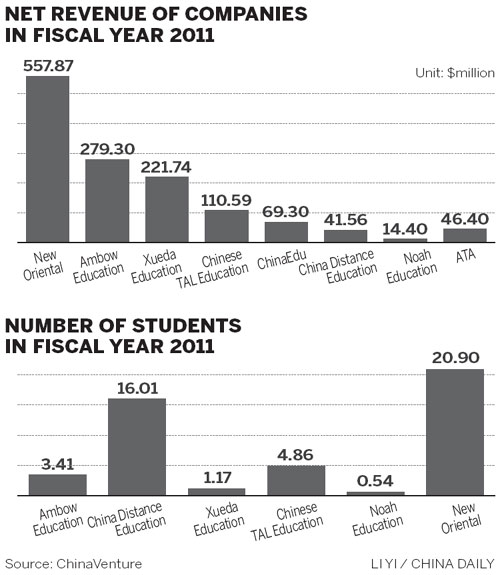
|
 |
|
New Oriental Education and Technology Group Inc's booth at an education exhibition in Beijing. China's listed companies from the education and training industry witnessed a high profit increase in the fiscal year of 2011 amid overall slowing economic growth. [Photo/China Daily] |
Out-of-hours lessons prove to be lucrative for private teachers
Li Yinting, a primary school student, takes extra lessons on both Saturday and Sunday mornings. The 10-year-old learns mathematics at a study center run by Chinese TAL Education Group and learns English at Riverdeep International Education Inc, one of the most expensive schools in Beijing.
He attends Beijing Haidian Experimental Primary School, a key primary school in the capital, from Monday to Friday.
"He has been taking English lessons at Riverdeep from his first grade," his mother, a gynecologist and obstetrician, said.
China's listed companies from the education and training industry witnessed a high profit increase in the fiscal year of 2011 amid overall slowing economic growth.
The net revenue of the eight educational enterprises that listed in the United States hit $1.34 billion in the fiscal year ending in 2011, increasing 42.5 percent from $941 million year-on-year. They realized accumulative profits of $165 million in the latest fiscal year, according to a report from ChinaVenture, a financial data and business information provider in China.
"Almost 90 percent of students in my class take part in supplementary lessons in training institutions outside school," said Wu Yueqin, a chemistry teacher from Beijing Yucai Middle School.
Taking extra-curricular tutorial classes is becoming a trend among students and their parents. Those who don't take the classes feel ashamed and cannot keep the pace up in study at school, Wu said. "If more than 80 percent of students have learned new knowledge, I don't need to waste time explaining it."
According to the chemistry teacher, many students spend time during the holidays learning the following term's lessons.
New Oriental Education and Technology Group Inc, the financially most successful company in the education and training sector, achieved $558 million net revenues with a year-on-year growth rate of 44.4 percent in the fiscal year June 1, 2010, to May 31, 2011. Its net profit hit $102 million, exceeding Ambow Education, the next best performer, by almost $63 million, according to the ChinaVenture report.
"With perfect teaching quality, New Oriental's brand is more competitive than its rivals," said Yang Zhihui, vice-president of New Oriental and in charge of its finances. "The opening of new teaching centers all over China also contributed to its good performance."
In the first three quarters of the fiscal year 2012, which ran from June 1 to February 29, the company opened more than 120 teaching centers. There are altogether approximately 2 million students currently studying with New Oriental, Yang said.
"To guarantee teaching quality, many training institutions have adopted a one-on-one teaching approach, which is impossible at school. It does, however, possibly harm students' opportunities to learn for themselves," said Wu.
"Many children, including my son, are obsessed with electronic games, which is bad for their health and study. Having extra-curricular tutorial classes prevents them from becoming addicted to these games and helps improve their grades," Li's mother said.
New Oriental's financial report shows its middle school education brand Youneng and children's education brand Paopao were still the main sources of revenue.
Noah Education Holdings Ltd earned $14.4 million net income last revenue year (from July 1, 2010, to June 30, 2011). Its growth rate of 134 percent was the highest.
After Noah's electronic learning products were replaced by the iPad and high-end smartphones, its profit declined sharply. Noah decided to abandon producing electronic items and to focus on pre-school education, basic education and auxiliary education.
Thanks to its rapid business adjustment, Noah's general income rapidly increased. Its total revenue in 2012 is expected to come entirely from the education industry, the report said.
"Relying on the huge domestic market demand, China's private training companies are more flexible and adaptable to market changes and so are able to achieve a sharp increase in revenue," said Fiona Wan, an analyst with ChinaVenture.
Li Yinting's mother would like to choose a famous training institution for her son. "Money is not a big problem. I just want my son to receive the best education, which is crucially important for his future."
Online Education
The rapid development of the Internet and the mobile Internet is changing the learning methods of students. Online classrooms are becoming an attractive and popular alternative to traditional brick and mortar classrooms.
"The combination of the Internet and education is the future direction," the ChinaVenture report quoted Huang Gang, vice-president of Ambow Education, as saying.
The hybrid English learning products TBL, launched by New Oriental last year, are a combination of online and offline teaching. It took the company one year to build the platform and another year to train teachers. After that, TBL was put successfully on the market.
"Revenues from online classes currently account for only 2 to 3 percent of our whole profits. Our main business is face-to-face teaching," Yang said. "With so many distractions for children, it's difficult for them to concentrate on learning on the Internet."
Li's mother said: "Most children my son's age like playing online games so it's impossible for them to sit by themselves to learn through the Internet."
Wu said: "The main problem with online teaching is that it cannot replicate one-on-one teaching, and answering students' questions face-to-face."
The report from ChinaVenture said there are several other obstacles in the way of training enterprises developing online businesses. Online and offline resources cannot fully combine and complement each other. The online business is likely to capture the market of the offline side but is unable to realize offline personalized coaching. The cost of developing new courses is high while the short-term income is uncertain.
"But we are keeping a close eye on the development of online education. We would like to spend money on its research and development," Yang added.
With the change in learning ideas and learning styles and the expansion of the Internet and mobile Internet-related education products come the inevitable choices to be made in how to adapt to the market development, the report said.
Li Yinting came back home happy on Saturday afternoon because he could finally enjoy one afternoon by himself without lessons. He was going to play his favorite game, Seer, for a couple of hours but had to get up early the next day to have an English lesson.
mengfanbin@chinadaily.com.cn



 Washington to remain focused on Asia-Pacific
Washington to remain focused on Asia-Pacific RQFII target blue chips amid bear market
RQFII target blue chips amid bear market Australian recall for top two exporters
Australian recall for top two exporters China fears new car restrictions
China fears new car restrictions